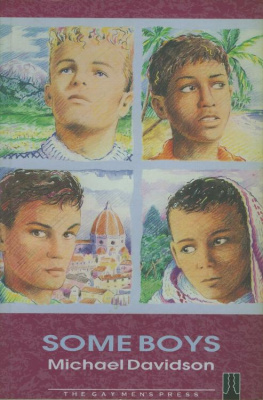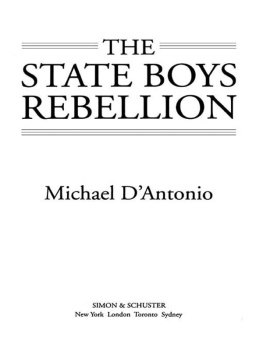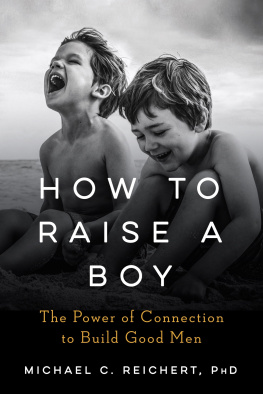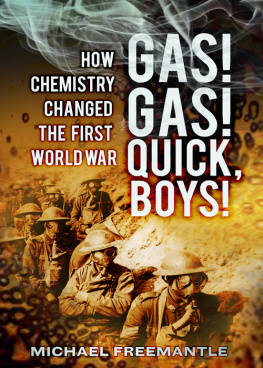MICHAEL DAVIDSON
SOME BOYS


First GMP edition 1988
Reissued in The Gay Men's Press Collection 1998
1970 and 1988 the estate of Michael Davidson
CONTENTS
MarrakechGenevaLahoreTel Aviv RangoonNaplesTangierTokyoRomeLondonBaliIschiaSaigon and HanoiTimbuctooCataniaDakarPurdahNomenclaturePostscript
MARRAKECH
THE CHLEUH is a southward looking man; from his home on the further slopes of the Atlas mountains or below in the Sous valley on the verge of the Sahara, the sun is forever in his eyesfrom the moment it rises somewhere beyond the Algerian sands until it reaches the rim of the moghreb el-aksa , the extreme west, he is face to face with it more starkly, surely, than any other. His back is always to the north and from the vast reflecting wall of the Atlas he gazes from birth to death into the burning south. That, at least roughly, has been his historical destiny since the Chleuh peoplethey are more than a tribehave been settled along the southern marches of Morocco.
And yet, in spite of all this ferocious sunshine, the Chleuhwho belong to a sept of the great Berber race of North Africaare a fair-complexioned, slender, small-boned people, elegant and even feminine in their movements, with delicate and slightly womanish features. The milky-white cheeks of their sons are often capable of a maidenly blush; while the sexual ambiguities of their tribal dance, performed by the boys and ephebes, are renowned. In this dance the youths wear an ankle-length white garment, more feminine than masculine, andespecially relevanta woman's belt; a girdle that no other North African male would dream of fastening round his waist; and the dance itself, executed to the beat of flute and tambour by twenty or more youths ranged in a circle, is a tremulous shuffling shimmy which we Westerners, most of us, would hail as a lovely send-up of a drag party. Yet what seems like an exercise in camp choreography in fact is a national tradition descended from a legendary past; the equivocal appearance and androgynous vibrations of these apparently bisexual boys are symbols and emblems evolved by history. But symbols of what?
What is the ancestry of this curious quivoque which one discerns in the tradition of the Chleuh, and even in their emotional temperament (though I've never heard that they're any more prone to homosexual behaviour than any other North Africansnor any less)? Whence comes this streak of femininity that seems to course through the generations of the Chleuh maleotherwise as masculine and vigorous as anybody? They are by nature a gentle people, farmers and foresters, tilling their terraces cut into the high mountain slopes, or their fertile fields by the river below, and living in small walled villages built in a style of which their great city of Taroudant is the noblest flower. I don't think the Chleuh, in the history of a half-continent's warlike people, have been specially prominent in war; they prefer a tranquil life. And, as I've said, their lives are sun-drenched day in, day out. Can it be that the very sun has something to do with it? While unqualified to proffer any theories about cause and effect, I can certainly say from experience that solar exuberance and sexual liberality are widely to be found coincident. In those golden hot latitudes where the sun blazes long and strong and, one often feels, for ever, where the soft sultriness of the atmosphere and the liberating lightness of one's scanty clothes together work like a refreshing aphrodisiacin those regions where the sun is really hot and seldom hidden except by night, there's a sexual laxity or tolerancepermissiveness is the modern wordwhich finds expression in almost any youth's perfect readiness to indulge his ever-brimming desires in whatever manner and with whichever sex he's offered. That this climatic permissiveness is widely recognized and respectably joked about is shown by that very old chestnut, recounted for at least half a century in London smoking-rooms and British officers' messes, about the Consul in Pernambuco. "You want woman? You want small girl? You want nice boy?" an important visitor, arriving in the city, is asked. "No, no," snaps the visitor testily, "I want the British Consul." Says the pimp: "That is difficult, but it can be arranged."
So the sun it may be; and even classical myth attributes to Apollo the introduction to humanityor at any rate a principal share in itof the male's love for a youth. Apollo, some ancient writers say, was the first god ever to love a member of his own sex and competed with the first mortal to do so, the poet Thamyris, for the affections of the lovely Hyacinthusindeed there were two other rival suitors for the boy Boreas and Zephyr, the North and West Winds. The latter was so enraged by Phoebus's apparent success that he caused the discus the boy was learning to throw to boomerang on to his own skull, killing him on the spot; and where Hyacinthus's blood fell, there sprang the flower. And although geographical purists may insist that this episode occurred in Sparta, a long way east of Morocco, it can't be denied that nowhere does Apollo's passionate eye stare with more fiery steadiness than upon the southern face of the Atlas mountain; and on those foothills undoubtedly the hyacinth grows.
The sun it may be; but the world's belt of perfervid sunshine is wide and broad, and there's no evidence that I know of that the Chleuh are more susceptible to unconventional seduction than anybody else. So the strange hermaphroditism of their dance and the hint of girlishness in their boys' demeanour remain unexplained, their causes hidden in the mists of antiquity.
Wrongly and deplorably, the city Arabs of Moroccodescendants, or claimants to descendance, from the original Arab invaders of the seventh and eighth centuries, largely living in the townsare inclined, or used to be, to dub "Chleuh" any Berber-speaking people in a tone of slight denigration; in the same way, somewhat, as all Latins in the United States used to be called "dagos." Mustapha, my "Arab" boy-companion for three happy years of long ago, himself certainly of Berber ancestry, used to say, apologizing for the rusticity of some visitor, "Oh, he's just a Chleuh," when in fact the visitor was nothing of the sort. Was, I sometimes wondered, the quite wrongful taint of general disparagement often given by the Arabs to the name, to be traced to this semblance of effeminacy tucked into a corner of a manly and martial nation?
A note of apology here to the reader, before this sketch nova on towards its proper terminationabout the tiresome and mechanical matter of transliteration. "Chleuh" is the French way of rendering the native sound; the phonetic capabilities of English orthography being small, the word is impossible to reproduce in Englishparticularly as the final h is aspirated, like a Greek "breathing". In German one could write Schlh , though that still doesn't sound the h : conventional transliteration from Arabic puts a dot underneath an aspirated h . In English perhaps one could write "Shlur"pronouncing the ur as in "absurd" or "turd", and trying to remember the final h .
* * *
All visitors to Morocco, from travellers in the days of Leo Africanus to members of the present-day "package tours" and coach-tour "safaris" which the world's travel-agents organize, want to see Marrakech, the great red city in the south, capital of the Atlas barons. And there, the first place they go to is the
Next page










